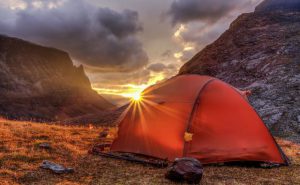There is an old photo hanging on the wall in my home. It’s a picture of my two boys clambering about in the backyard when they were both under the age of five. Neither of them are wearing a coat, and their feet are clad in rubber boots, so you can assume the weather is warmish. You’d think the exact time of year might be difficult to tell, yet it isn’t. There’s something about the quality of light shining down on them that’s a dead giveaway – you know right away that the season is spring.
I’ve often looked at that photo and wondered about the changing colours of light. I’m fascinated by the brighter whiteness of spring light compared with the more yellow and orange shades of autumn, and I’ve wondered: are my perceptions of light subconsciously altered by my knowledge of the time of day and the season? Or does the colour of light really change? How is it that you can wake up after a long nap and know, without even checking your clock, the approximate time of day?
A scientist would tell me that this isn’t a mystery at all. The colour of light does change as the days unwind and the seasons pass, and it all depends on wave frequency. Because of changes in the frequency of light, morning light has a predominantly blue/green shade, making it appear substantially different to our eyes than afternoon light, which has more red/orange colour.
This may seem a largely cerebral distinction. Who cares what colour the light is anyway? But when it comes to our health, it matters a lot. It matters because all of our modern devices – our computers, our smartphones, our tablets, our televisions – emit a blue-green light, which tricks our brain into thinking that it’s morning when it’s not. This is why widespread use of electronic screens late at night has led to a scourge of sleep deprivation.
When we check and use electronic devices late at night, melatonin production in our brains is shifted by two or more hours, making it difficult for us to fall asleep at night, and even harder to wake up in the morning. Like a nocturnal creature, melatonin loves darkness, and becomes engaged and effusive during the night, while exposure to light weakens it. If there’s one characteristic of the modern world, it’s chronic exposure to light, and since most of us watch TV or use our computers late at night, this means that most of us are experiencing a considerably diminished production of melatonin. No wonder we can’t sleep.
Chronic tiredness isn’t just a psychological problem, it’s also a physical one. Sleep deprivation is associated with higher rates of obesity, diabetes, and depression. It makes us less productive during working hours, and also more prone to dangerous accidents.
However, a new study published in the journal Current Biology provides hope. Researchers in the study divided subjects into two groups and then monitored their melatonin levels. One group of people slept outside in tents for a week, and the others remained indoors. After camping out of doors all week, natural melatonin production shifted and began to rise in the outdoor sleepers. Compared with those who continued to sleep indoors, the outdoor sleepers also went to sleep earlier and woke up earlier, and slept an average of two or more hours longer. In another, earlier study, outdoor sleepers were able to increase their melatonin production and shift their sleep cycle by more then one hour after just one weekend spent sleeping outdoors.
These studies demonstrate the importance of light exposure for proper sleep, and reveal why sleep experts recommend dimming all lights, and removing all electronic screens from the bedroom at least an hour before going to bed. If you continue to struggle with sleep even after carefully dimming or removing all light sources, a weekend camping trip is another good option. As these new studies show, the enriching blue, natural light of morning has a powerful influence on our internal clock, and can quickly recalibrate the body’s natural circadian rhythm. Why not take a trip now, while the scenery is so delicious, and the temperature is still warm?
https://www.cbsnews.com/news/cant-sleep-camping-resets-body-clock/
About the Author: Rebecca Wong has a BA in English Literature from the University of Waterloo and has been working in the herbal business since 2000. She studied at the Ontario College of Traditional Chinese Medicine under respected authorities Paul Des Rosiers and Vu Le, and graduated from the East West School of Planetary Herbology under Michael Tierra. She received training as a yoga teacher at The Branches in Kitchener/Waterloo, and therapeutic yoga teacher training from the School for Somatic Soulwork under Deniz Aydoslu. She now teaches yoga for anxiety, depression and burnout at Rebecca's Restful Yoga Studio in Toronto.
